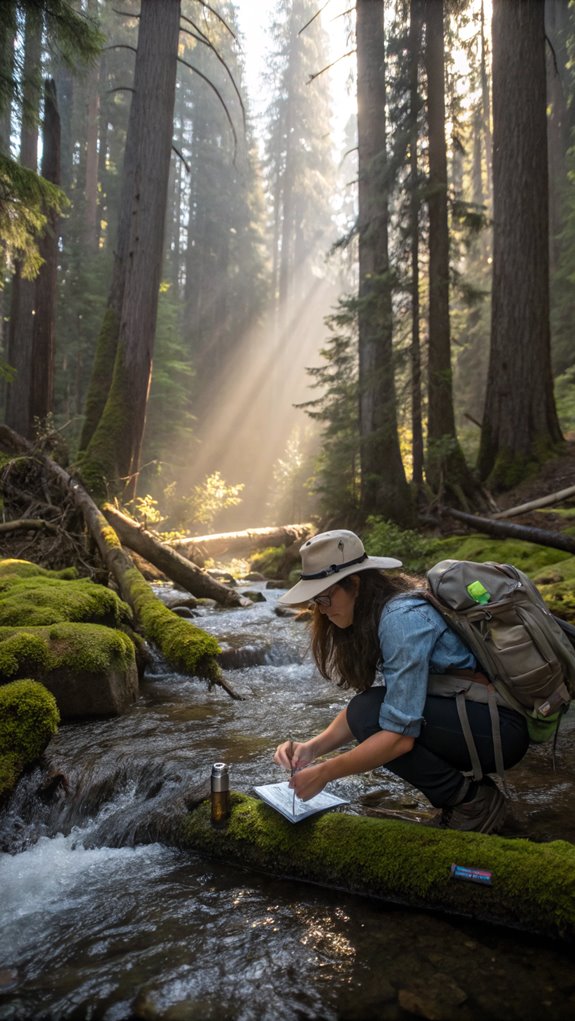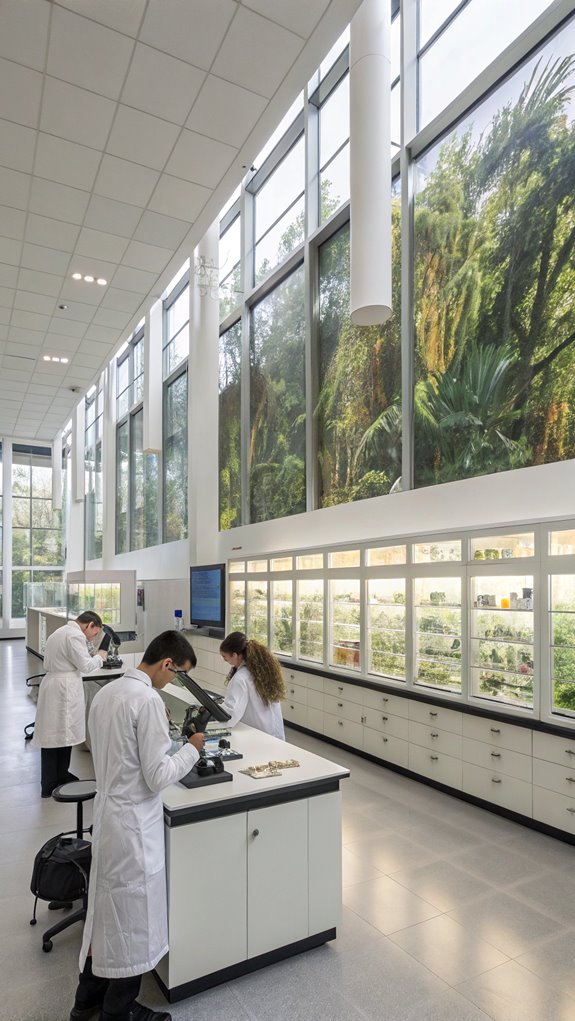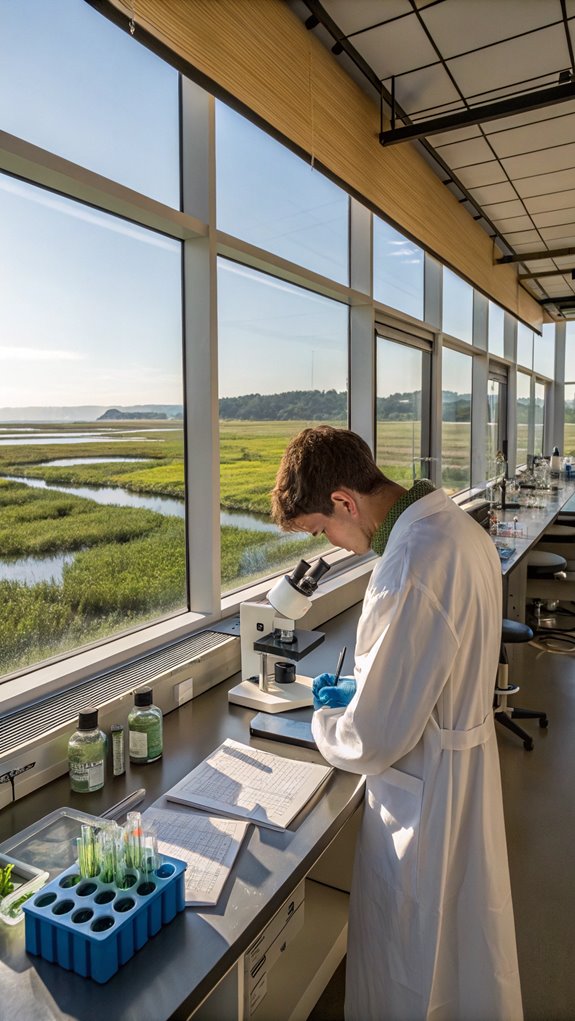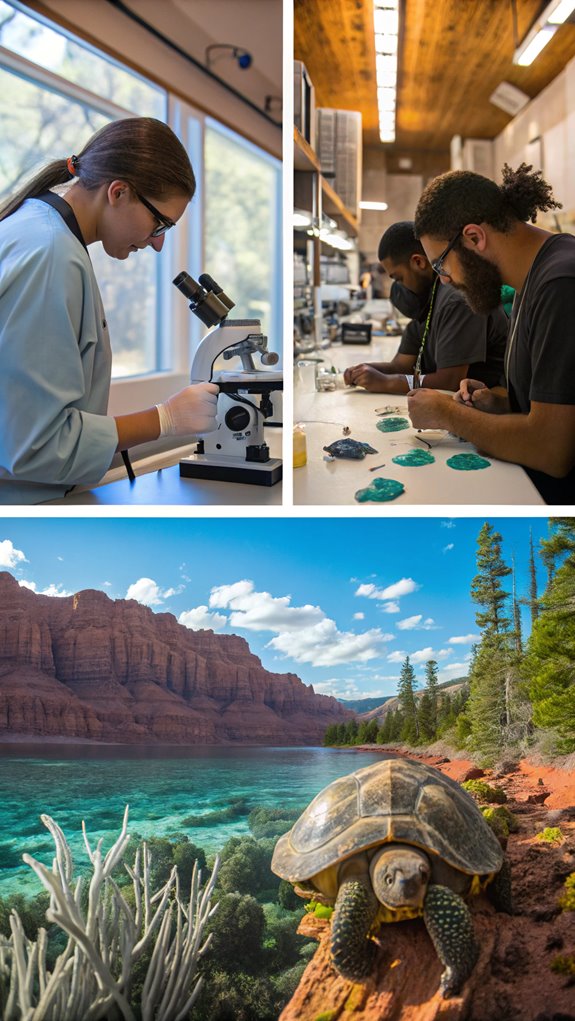You'll find excellent ecology bachelor's programs across the USA, with standout options at UC Davis, Connecticut College, and Texas A&M. These programs offer specialized tracks in conservation biology, ecological restoration, and environmental studies. You can expect hands-on fieldwork, state-of-the-art research facilities, and strong career prospects with 5% job growth projected over the next decade. While top private universities charge $40,000-60,000 annually, public institutions average $10,464 for in-state tuition. From wildlife biology to environmental consulting, your ecology degree can open doors to diverse career paths. Discover how each program's unique regional focus could shape your environmental future.
Why Study Ecology

As environmental challenges continue to mount globally, pursuing an ecology degree offers numerous compelling benefits for aspiring scientists and environmental professionals. You'll enter a field that's in high demand, with employers actively seeking candidates who possess ecological expertise. The career opportunities are diverse, spanning research institutions, government agencies, environmental consulting firms, and nonprofit organizations. The degree enables you to develop analytical and research skills that are highly valued in the field.
When you study ecology, you'll gain critical skills for understanding and addressing climate change impacts on ecosystems. You'll learn to develop conservation strategies, preserve natural habitats, and assess human activities' environmental effects. This knowledge is essential for maintaining biodiversity and developing sustainable management practices for our planet's resources.
Your education will include unique hands-on experiences through field study trips, where you'll apply theoretical concepts in real-world settings. The interdisciplinary nature of ecology combines biology, environmental science, and evolutionary biology, providing you with an extensive understanding of ecological systems and their interconnections.
Professional development opportunities in ecology are substantial. You'll develop scientific leadership skills and can pursue various graduate study options to further specialize your expertise. The degree serves as an excellent foundation for broader biological studies and can lead to respected positions as an environmental educator, conservation researcher, or environmental consultant. By choosing ecology, you're not just selecting a career path – you're positioning yourself to contribute meaningfully to environmental conservation and sustainability efforts worldwide.
Top Ecology Programs
Excellence in ecological education can be found at numerous prestigious institutions across the United States. You'll discover top programs at institutions like Connecticut College in New London, where you can engage in diverse ecological studies, and the University of Maryland-College Park, which offers extensive interdisciplinary programs. New York University and Iowa State University provide strong foundations in ecological sciences, while UC Santa Cruz features ample environmental studies opportunities. The acceptance rate of 48.8% at UC Davis makes it an accessible option for many students.
If you're looking for specialized programs, you'll find exceptional options at the University of Pennsylvania, focusing on evolution and systematics biology. Columbia University and Cornell University offer robust environmental science majors with strong ecological components. UC Berkeley's interdisciplinary approach and the University of Montana's extensive restoration programs stand out for their thorough coverage of ecological sciences.
You'll find unique specializations across different institutions. The University of Montana emphasizes ecological restoration and conservation, while Colorado College offers varied environmental studies tracks. Colby College integrates biological and ecological sciences, and SUNY-ESF concentrates on natural resources and conservation. The University of Washington provides interdisciplinary programs in environmental science and resource management.
These programs prepare you for diverse career paths. You can pursue positions as a field or research technician, wildlife biologist, outdoor educator, or park naturalist. Laboratory assistant roles are also available, allowing you to contribute to important research projects. Each program's unique focus helps you align your education with your career goals in ecology and environmental science.
Admission Requirements

Meeting admission requirements for ecology programs demands strong academic preparation and careful attention to prerequisites. You'll need a bachelor's degree in ecology, biology, or a related field, maintaining a minimum GPA of 3.0 on a 4.0 scale. If you have any course deficiencies, you can remedy them by taking additional undergraduate classes during your graduate studies.
Your undergraduate coursework should include at least three classes in biological sciences and five courses in physical sciences and mathematics. You'll need to complete foundational courses in biology, chemistry, and physics. Additionally, you should have taken statistics and ecology courses, as these are preferred by most programs. Some programs specifically require calculus and statistics courses as prerequisites. Applications are accepted year-round for these programs.
The application deadline is typically December 1 for fall semester admission if you want full consideration for fellowships and financial aid. You'll need to submit official transcripts and two letters of recommendation. While GRE scores aren't required for some programs, you should prepare a statement of purpose limited to two pages.
While it's not always necessary to secure a faculty advisor before applying, you're encouraged to contact faculty members whose research interests align with yours. Some programs may require confirmation from a faculty advisor. You must also meet any university and college-specific degree requirements. Remember that even if you're missing some prerequisites, many programs offer flexibility, allowing you to complete missing requirements while enrolled in the program.
Program Curriculum
The thorough curriculum in ecology bachelor's programs combines foundational sciences with specialized environmental studies. You'll start with essential biology, chemistry, mathematics, and statistics courses that build your scientific foundation. These core classes include hands-on lab components, where you'll gain practical experience in scientific methods and data analysis. Faculty experts collaborate with students to enhance fieldwork and research capabilities.
As you progress, you'll immerse yourself in core environmental studies courses focusing on ecology, conservation, and environmental biology. You'll explore environmental policy and economics to understand the broader context of ecological issues. The program offers various tracks for specialization, allowing you to focus on areas that match your interests and career goals.
Your advanced coursework will include specialized topics like wildlife ecology, plant biology, and environmental conservation. You'll study environmental law, sustainability, and natural resource management while learning about human impacts on ecosystems. The curriculum emphasizes research methods and scientific writing to prepare you for professional work or graduate studies.
In your final year, you'll complete a capstone or senior project that demonstrates your extensive understanding of ecological principles. This typically involves conducting independent research under faculty supervision and presenting your findings. You'll participate in advanced seminars that explore specific environmental topics in depth, often collaborating with peers on interdisciplinary projects. Throughout the program, you'll have opportunities for fieldwork and practical research experience, ensuring you're well-prepared for a career in ecology or environmental science.
Research Opportunities

During your undergraduate studies, you'll discover extensive research opportunities through state-of-the-art facilities and diverse field sites across the country. You'll have access to notable research stations like Miami University's 69-hectare Ecology Research Center and Boston University's Tiputini Biodiversity Station in the Amazon rainforest, where you can conduct hands-on fieldwork in varied ecosystems. Many programs support customized field experiences that can be tailored to specific research interests and academic goals.
You'll engage in both aquatic and terrestrial ecology research, exploring freshwater systems, marine environments, and land-based ecosystems. The program's focus areas include conservation biology, ecological modeling, and socio-environmental systems, allowing you to investigate human impacts on ecosystems and develop solutions for environmental challenges.
You'll learn to use advanced research tools and techniques essential for modern ecological studies. These include molecular genetics equipment, stable isotope analysis, remote sensing technology, and geographic information systems (GIS). You'll also gain proficiency in statistical analysis and computational modeling to predict ecological changes and analyze complex environmental data.
The program emphasizes collaborative research through faculty-student partnerships and interdisciplinary projects. You'll work alongside experienced researchers, integrating ecology with fields like geology, anthropology, and economics. There are opportunities to participate in international research projects, particularly in tropical regions, and engage with local communities through environmental education initiatives. You'll also benefit from specialized research facilities at institutions like the University of Virginia's field sites and the NOAA and DOE meteorological stations, which provide real-world data collection experience.
Specialization Tracks
Building on your research foundation, specialized tracks in ecology bachelor's programs let you focus on specific environmental interests and career goals. You'll find diverse options across U.S. universities, each offering unique pathways to ecological expertise.
At Texas A&M, you can choose from four distinct tracks: Ecology and Conservation Biology, Ecoinformatics, Forest Resources, and Vertebrate Zoology. If you're interested in combining digital technology with ecological research, the Ecoinformatics track will prepare you for modern conservation work. The Vertebrate Zoology track provides an excellent foundation if you're planning to pursue veterinary medicine.
Michigan Tech's Applied Ecology program offers specialized concentrations in Plant and Wetland Ecology, Communicating Natural Resources, and Ecological Assessment and Restoration. You'll learn practical skills like habitat restoration and ecosystem management while developing expertise in your chosen area. Students gain valuable experience through hands-on marine fieldwork in locations like New England and Belize.
BU's Biology program with Ecology & Conservation Biology specialization guarantees thorough training through required laboratory work and advanced coursework. You'll need to complete at least three lab-based courses and three 300+ level courses, giving you hands-on experience in your field of interest.
At UNH, the Environmental Sciences Major with an Ecosystems option focuses on the interactions between living and non-living components of natural systems. You'll study biodiversity, ecological processes, and human impacts while preparing for a career in sustainability and conservation. The program combines foundational biology courses with specialized environmental science and natural resources coursework.
Career Prospects

Graduates with ecology bachelor's degrees face promising career prospects across diverse sectors. With a projected 5% job growth rate over the next decade and 3,800 new positions expected to be added to the existing 80,000 jobs, you'll find opportunities in government agencies, consulting firms, and non-profit organizations.
You can choose from various career paths depending on your interests. If you're drawn to research, you'll work in laboratories analyzing samples and conducting experiments. For those who prefer fieldwork, positions as field technicians or wildlife biologists offer chances to study populations and develop conservation plans. The education sector welcomes ecology graduates as outdoor educators and program developers, while environmental consulting firms seek professionals who can assess environmental impact and provide solutions. Many graduates pursue careers at natural history museums and zoos, where they contribute to public education and species preservation.
Your bachelor's degree will qualify you for entry-level positions, but you'll need advanced degrees for senior roles or research positions. The field demands strong analytical and problem-solving abilities, coupled with excellent communication skills for collaborating with stakeholders. You'll find work environments ranging from offices and laboratories to outdoor settings, depending on your specialization.
Key sectors hiring ecology graduates include environmental consulting, conservation and natural resource management, education and research, biotechnology, and non-profit organizations. As a park naturalist, you might manage resources and develop educational programs, while as a wildlife biologist, you'll study animal populations and create conservation strategies. Optional certifications from the Ecology Society of America can enhance your credentials for advanced positions.
Tuition and Financial Aid
Most ecology bachelor's programs in the USA have varying tuition costs depending on the institution type and location. At top universities like Berkeley, Stanford, MIT, and Harvard, you'll find tuition ranging from $40,000 to $60,000 annually. Less prestigious institutions charge between $20,000 to $30,000, while in-state tuition averages $10,464 per year. If you're considering online options, programs like Oregon State University's Ecampus charge $366 per credit, totaling around $13,191 annually for 12 credits per term.
You'll need to explore various financial aid options to manage these costs effectively. Federal, state, and local government funding are available, but you'll need to submit admissions essays, transcripts, recommendation letters, and language test results. Many universities offer payment plans to help you spread out your tuition costs, and you can reduce expenses by choosing cost-effective living arrangements.
Consider combining multiple strategies to fund your education. You'll also need to budget for essential materials and activities required throughout your program. You can work part-time jobs or internships, take fewer credits per semester, or opt for online courses to save money. It's essential to research private scholarships and grants specific to ecology programs. Remember that tuition rates typically increase annually, so you'll want to plan for long-term financial sustainability.
When choosing your program, compare costs across different institutions while considering post-graduation income potential and debt repayment. You can meaningfully reduce your overall expenses by applying for scholarships, choosing affordable housing options, and carefully managing your course load each semester.
Regional Program Differences

Each region in the USA offers unique ecology programs that reflect local environmental challenges and ecosystems. You'll find Western colleges focusing on dryland ecology and water management, while Northeastern institutions emphasize forest ecology and wildlife conservation. If you're interested in marine ecosystems, coastal colleges provide specialized studies in oceanic environments and coastal resilience. Midwestern programs concentrate on agricultural ecology and freshwater management, and Southern institutions prioritize biodiversity and wetland conservation.
The research opportunities vary considerably by region. At Colorado State University, you can immerse yourself in natural resources research, while the University of Washington excels in earth and environmental science studies. Students at the University of New Orleans can access specialized research laboratories including the Coastal Research Laboratory and Nekton Research Laboratory. If you're drawn to forest science, the University of Wisconsin-Madison offers extensive opportunities in conservation biology.
You'll discover diverse curriculum approaches across regions. Colorado College integrates environmental studies with chemistry and physics, while the University of New Orleans provides a thorough earth and environmental sciences degree with multiple concentrations. Schools like Amherst College take an interdisciplinary approach, and Colby College offers specialized tracks in ecology and evolution.
Your studies will often align with local ecoregions, following the EPA's spatial framework for environmental management. For instance, if you attend the University of Montana, you'll study ecological restoration within the context of local ecosystems. At SUNY-ESF, you'll focus on environmental science and forestry, reflecting the northeastern region's ecological characteristics. The University of Washington's programs emphasize aquatic and fishery sciences, directly connecting to the Pacific Northwest's marine environment.
Student Success Stories
Ecology's success stories paint an inspiring picture of where your degree can take you. At Muskingum University, graduates have secured positions in environmental lands management and non-native species control, while others have advanced to graduate programs focusing on evolution and ecology. Alumni like Amanda Logan and Alex Furst have made significant contributions through grassland bird research at the Wilds. Alumni actively contribute to environmental research projects and assess the impacts of non-native wildlife on ecosystems.
You'll find valuable research opportunities through programs like Penn State's EnvironMentors, where you'll develop essential lab skills and gain confidence in scientific research. You'll work alongside faculty members and peers on STEM projects that address real environmental challenges. High school students who participate often discover a deepened passion for STEM fields through their college-level research experiences.
At Unity Environmental University, you'll gain practical conservation skills through hands-on wildlife experiences. The program's flexibility and affordability have helped graduates pursue their environmental goals and continue their education. You'll learn to apply your knowledge directly to real-world environmental issues.
General ecology programs will strengthen your critical thinking abilities and deepen your understanding of biodiversity and conservation. You'll develop skills to analyze environmental data and gain a global perspective on ecological challenges. These programs prepare you to contribute meaningfully to sustainable environmental practices, whether you're heading into research, management, or conservation roles. The skills you'll acquire will position you to address complex environmental issues and advance in various ecological career paths.

Erzsebet Frey (Eli Frey) is an ecologist and online entrepreneur with a Master of Science in Ecology from the University of Belgrade. Originally from Serbia, she has lived in Sri Lanka since 2017. Eli has worked internationally in countries like Oman, Brazil, Germany, and Sri Lanka. In 2018, she expanded into SEO and blogging, completing courses from UC Davis and Edinburgh. Eli has founded multiple websites focused on biology, ecology, environmental science, sustainable and simple living, and outdoor activities. She enjoys creating nature and simple living videos on YouTube and participates in speleology, diving, and hiking.
🌿 Explore the Wild Side!
Discover eBooks, guides, templates and stylish wildlife-themed T-shirts, notebooks, scrunchies, bandanas, and tote bags. Perfect for nature lovers and wildlife enthusiasts!
Visit My Shop →
